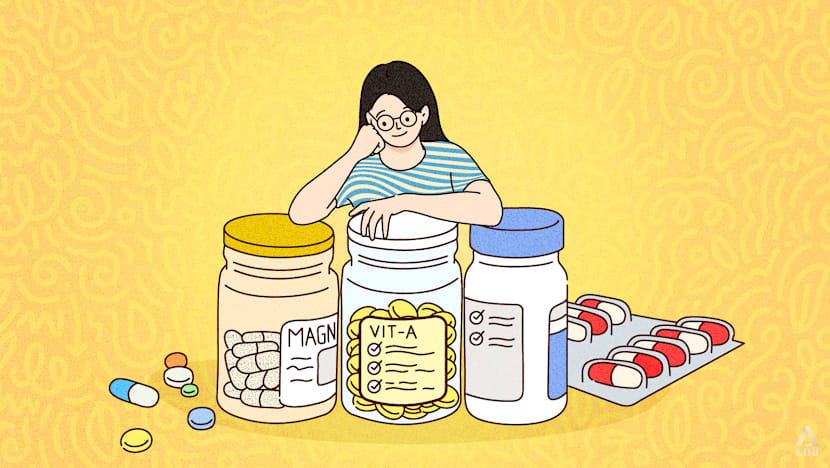Health
Do You Really Need Supplements for Better Health and Energy?

Many individuals find themselves questioning the necessity of dietary supplements for improved energy, clearer skin, or better sleep. The conversation surrounding supplementation has intensified, particularly among adults navigating the complexities of life, such as career demands, financial responsibilities, and maintaining wellness.
A personal health journey highlights these concerns. After discovering that she had iron-deficiency anemia over a decade ago, a woman began taking iron supplements intermittently, often resorting to them only during periods of fatigue. However, a recent health scare in May 2023 prompted her to reevaluate her approach to nutrition. After experiencing persistent fatigue and shortness of breath, she sought medical advice, leading to a blood transfusion and a renewed commitment to regular supplementation.
The online marketplace offers a dizzying array of supplements, with various brands promising enhanced energy, skin clarity, and improved sleep. This consumer landscape raises a crucial question: Are supplements truly essential, or can dietary adjustments suffice to address nutritional deficiencies?
Experts Weigh In: Supplements vs. Diet
Nutritional experts generally agree that a well-planned, balanced diet is adequate for most healthy individuals to meet their nutritional needs. Dr. Kalpana Bhaskaran, president of the Singapore Nutrition and Dietetics Association (SNDA), emphasizes that supplements should not replace whole foods. Whole foods—minimally processed items close to their natural state—provide essential nutrients, including fiber and phytonutrients, that supplements cannot replicate.
According to Dr. Alvin Wong, a senior principal research dietitian at Changi General Hospital (CGH), “Food should come first.” He notes that while supplements can help fill specific gaps in nutrition, they should not be seen as a means to enhance an already healthy diet.
The necessity of supplementation may arise in specific circumstances, such as aging, pregnancy, or chronic illnesses that affect nutrient absorption. Ms. Rachel Tok, a dietitian from the National University Hospital (NUH), explains that changes in the gastrointestinal tract can reduce nutrient absorption as individuals age, making certain nutrients harder to obtain from food alone. Common deficiencies among older adults include vitamin D, vitamin B12, calcium, and iron.
For individuals with mild iron-deficiency anemia, dietary modifications—such as increasing iron-rich foods like red meat and spinach—can be beneficial. Yet, those with moderate to severe cases typically require supplements to quickly restore iron levels.
Guidelines for Safe Supplement Use
Consumers are cautioned against self-prescribing supplements as a panacea for health issues. Dr. Bhaskaran advises individuals experiencing symptoms to first assess their lifestyle choices, such as sleep quality, nutrition, and hydration. If symptoms persist for more than two to three weeks, consulting with a healthcare provider is essential. Clinical evaluations, including blood tests, can identify specific nutritional gaps.
Dr. Wong cautions that the approach to starting supplements should mirror the careful considerations applied to medications. Common misconceptions exist around the belief that higher doses of supplements translate to better health. Megadosing—consuming vitamins or minerals at levels significantly exceeding recommended dosages—can lead to toxicity.
For instance, while water-soluble vitamins like B and C are generally excreted through urine without harmful effects, fat-soluble vitamins (A, D, E, K) can accumulate in the body and cause adverse effects. Excessive vitamin A intake may result in symptoms ranging from nausea to liver damage, while too much calcium can lead to kidney stones or hinder the absorption of other nutrients, such as iron.
The HealthHub, the national digital healthcare platform, publishes the Recommended Dietary Allowance (RDA) guidelines, which outline daily nutrient intake levels necessary for healthy individuals.
When considering supplementation, consumers should prioritize choosing reputable brands that disclose manufacturing practices and quality control standards. Products that display third-party testing certifications signal a commitment to safety and efficacy. Labels should contain clear ingredient lists, avoiding vague terms and unnecessary additives.
Ultimately, optimising dietary quality remains paramount. While supplements can serve as supportive tools, they should not replace a balanced diet rich in whole foods. Dr. Wong reinforces that comprehensive lifestyle modifications yield far greater health benefits than any individual supplement. Maintaining adequate protein intake, engaging in regular physical activity, ensuring quality sleep, and moderating alcohol consumption are foundational components of overall health.
In summary, while supplements can play a role in addressing specific deficiencies, a balanced diet and healthy lifestyle practices should form the cornerstone of nutritional health.
-

 Lifestyle4 months ago
Lifestyle4 months agoHumanism Camp Engages 250 Youths in Summer Fest 2025
-

 Business5 months ago
Business5 months agoKenvue Dismisses CEO Thibaut Mongon as Strategic Review Advances
-

 Sports4 months ago
Sports4 months agoDe Minaur Triumphs at Washington Open After Thrilling Comeback
-

 Sports5 months ago
Sports5 months agoTupou and Daugunu Join First Nations Squad for Lions Clash
-

 Top Stories5 months ago
Top Stories5 months agoColombian Senator Miguel Uribe Shows Signs of Recovery After Attack
-

 World5 months ago
World5 months agoASEAN Gears Up for Historic Joint Meeting of Foreign and Economic Ministers
-

 Health4 months ago
Health4 months agoNew Study Challenges Assumptions About Aging and Inflammation
-

 Business5 months ago
Business5 months agoOil Prices Surge Following New EU Sanctions on Russia
-

 Entertainment4 months ago
Entertainment4 months agoDetaşe-Sabah Violin Ensemble Captivates at Gabala Music Festival
-

 Entertainment4 months ago
Entertainment4 months agoBaku Metro Extends Hours for Justin Timberlake Concert
-

 Top Stories5 months ago
Top Stories5 months agoRethinking Singapore’s F&B Regulations Amid Business Closures
-

 Business5 months ago
Business5 months agoU.S. House Approves Stablecoin Bill, Sends to Trump for Signature









